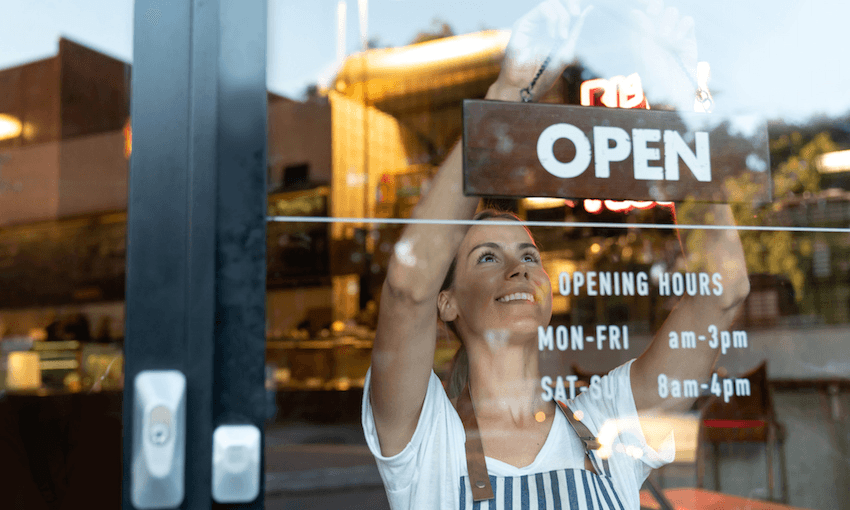Covid-19 forced both shoppers and small businesses to quickly adapt to a digital-only world. As life returns to something closer to normal, Visa’s Marty Kerr explains how businesses can respond to consumers’ changed habits.
It’s a situation so outlandish, not even the most doomsday-prepared could’ve had a plan in place. Before March 25, when the majority of New Zealand’s businesses were ordered to shut their doors for over a month to protect the nation from the spread of Covid-19, a global pandemic had not been part of forecasting.
The business world was immediately turned on its head, with any company that didn’t have a strong pre-existing e-commerce or mobile presence suddenly feeling the very urgent need for one.
New Zealand’s small businesses were hit particularly hard by the shift. Without the same resources at their disposal as the bigger players, they most likely had a smaller online presence. That had to change, fast, when their normal customer base was decimated in a matter of 48 hours.
“There was a big group of consumers and businesses that literally had no or very little experience or exposure to online trading, and through necessity because of Covid-19, have had to come on to the digital curve, says Marty Kerr, Visa’s country manager for New Zealand and South Pacific.
“The challenges were everything from, ‘How do I translate my business, be it goods or services, in the digital environment?’ to ‘Is it even relevant for online?’ I think some that felt their business might not translate to an online environment have been happily surprised.”
To help kickstart progress and strengthen New Zealand’s digital shopfronts, Visa has launched Where You Shop Matters, which includes a Business Locator Tool alongside free e-commerce and marketing packages for small businesses. The initiative is about showing New Zealanders the power of where they choose to spend their money and reducing the costs for local businesses to get online.
“While e-commerce presents new revenue avenues for merchants, it can be a new territory for many businesses who might not have an online presence, or who need to enhance their current online offering – so we’re pleased to offer Visa’s support to help make this digital process easier for SMEs,” Kerr says.
With Visa’s Tools For Small Businesses, companies can apply for a free $500 ad booster programme to elevate their social media presence and reach more customers, as well a complimentary three-month Shopify website subscription, worth around $1300, to build a digital store with the latest online payments technology.
The tools come at an essential moment for New Zealand’s SME community, because while it might appear to be “business as usual” at alert level one, it’s clear the business landscape has been altered considerably. Whether this is a long-term change is yet to be seen, but both business owners and consumers have adapted to a new normal, which comes with new opportunities – and new challenges.
How e-commerce can enhance the ‘shop local’ ethos
Thanks to the unifying experience of New Zealand’s lockdown, “shop local” has taken on a whole new meaning. Consumers know that making this choice goes beyond just showing support – their dollars are contributing to the health of New Zealand’s economy in tough times and helping with business survival.
“There’s been a proliferation of people wanting to explore different pockets of local,” Kerr says. “Many of our local businesses are small businesses, so you know that when you spend with them, your consumer dollar’s getting really close to the pocket of the person who’s brewing the beer, or making the bread.”
While capturing the spend of people within a 5km radius is great, there are also Kiwis in far-flung corners of the country who want to spend with local businesses beyond their town. Plus, there’s also an opportunity right now to attract international customers, which is where a strong e-commerce offering comes in.
Sea-to-plate businesses such as Gisborne’s East Rock, which catches tarakihi, and Wairarapa’s Tora Collective, which catches crayfish and pāua, pivoted during lockdown from selling wholesale to restaurants to direct to consumers online around the country. It’s a change in their business model that’s here to stay.
“In order to survive, we had to change our business model really quickly to keep our dream alive and keep being able to provide New Zealand with fresh kaimoana,” Tora Collective’s Claire Edwards says. “We had to create efficiencies in terms of getting it direct to people’s doors. Being a live product, you can’t chuck it on the back of a courier, so we had to make sure it’s going from coast to plate, same day.”
Visa’s Business Locator Tool helps connect New Zealand shoppers with open and operating local businesses. A hyper-local, interactive map-based web tool lets people search for businesses that are open and trading by region, based on whether the merchant has processed a Visa transaction in the last 24 hours.
The tool is updated daily and can be filtered by location and business category – for example, if you’re visiting Waiheke Island you could drill down to see which cafes, restaurants or retail shops are open. New Zealand is one of the few markets in which Visa has deployed the tool, which was originally created in response to Hurricane Harvey in the United States in 2017.
Some now prefer online convenience over face-to-face interactions
For many, the unprecedented life changes brought about by the Covid-19 restrictions led to FOMO being replaced by FOGO – the Fear Of Going Out. Now the question is whether behaviours adopted during the country’s heightened alert levels – like business meetings over Zoom or ordering groceries online – will change the game for businesses in the long term.
Usually offering multi-course degustations, during level three the owners of three Auckland restaurants that specialise in fine dining – Sidart, Sid at the French Café and Cassia – created a new booking system for online orders for their unique version of “takeaways”.
Instead of the usual dine-in $175 10-course tasting menu at Sid at the French Café, people could order home-style dishes online to be delivered for $45 a person. The restaurants were able to keep their staff employed over this time by redeploying some of them as delivery drivers. Now that the doors are open again, the at-home menus are staying in place too.
“It’s all about right-sizing the solution and figuring out what is the sustainable new norm for the business,” says Kerr. “Do I run the business the way I’ve always done it, or is it a combination of everything I’ve done previously with some new aspects added to it?
“Being able to offer the choice and serve customers in the way they want to be served is a very powerful business experience.”
A diversified business is a more resilient business
For businesses deemed non-essential, the level four lockdown was a test of just how resilient the systems they had in place were. A strong digital presence alongside bricks-and-mortar proved essential. Businesses banished online were forced to be agile, move fast and come up with creative products or services to suit shoppers’ needs.
“If you are operating purely in a face-to-face environment, you are very heavily reliant on foot traffic,” Kerr says. “That does work for a lot of businesses, but it means you don’t have diversification in your customer base.”
Faced with the closure of its physical stores nationwide, New Zealand clothing brand Ruby began selling sewing patterns online for some of its most beloved pieces. For customers suddenly with ample time on their hands at home, the demand for the pieces was so high, the first release of patterns sold out within a few hours of being announced. Now, the sewing patterns and fabric samples have become a permanent offering on Ruby’s website.
As businesses move to an e-commerce-first approach, Kerr says they should ensure they’re providing a frictionless and secure online checkout experience. Another aspect to consider is making sure delivery or pick-up time frames are realistic by having an in-depth understanding of the logistics.
“It’s really, really important for customer trust and confidence that something’s going to turn up when they expect it, and within a timeframe that is reasonable for what they buy and where it’s coming from,” Kerr says.
E-commerce lets you build closer relationships with your customers
In a bricks-and-mortar store, the idiosyncrasies of an individual client are filed away in the manager’s memory, or it’s the individual barista’s responsibility to remember a regular’s order. Collecting data on a person’s preferences and securely storing it on file can enhance and personalise the customer experience when people come to click-and-collect.
“It starts to open up quite different opportunities for businesses to start thinking about,” Kerr says. “How do I know and anticipate when this person’s going to come in; are they predictable and do they have a consistent coffee pattern and order? That’s really exciting for small businesses because it’s going to transform the way they serve their local community.”
Businesses like Black & White Coffee Cartel have kept a click-and-collect option in place through an order-online platform and app post-lockdown, so their customers who prefer it can still opt for that option.
“Your ability to serve up a one-to-one consistent and personalised consumer experience is significantly enhanced when you’ve got a very strong digital offering in your business,” Kerr says.
“Over time, we’re going to see things like artificial intelligence and clever use of data start to tailor that to preferences, recommendations, and other brands. And I really, truly believe it will not be exclusively the domain of big business or large international companies.”
One thing’s for sure: the road to recovery looks different for each business in New Zealand, and it’s by no means linear either. But Kerr says strengthening your online presence is one of the most important steps to take to get customers back interacting with your brand.
“I think the advantage you’ve got in New Zealand is your ability to promote yourself as a local business, and if you can make that experience even more one-to-one, that’s a really exciting emerging trend that lends itself beautifully to e-commerce.”

